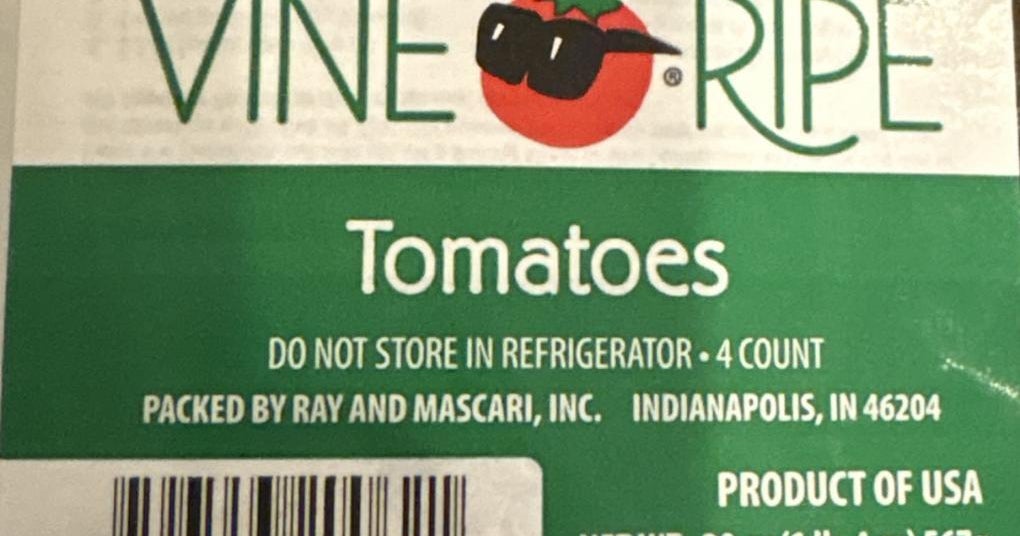Recent food safety concerns have prompted the recall of two brands of tomatoes in 14 states due to potential salmonella contamination. The Food and Drug Administration (FDA) disclosed this week that Ray & Mascari Inc. is recalling its Vine Ripe tomatoes sold via Gordon Food Service Stores, affecting major states such as New York, Illinois, and Pennsylvania. Additionally, Williams Farms Repack LLC has announced a recall of its tomatoes distributed to wholesalers in South Carolina, North Carolina, and Georgia, highlighting ongoing vigilance necessary in the food processing industry.
| Article Subheadings |
|---|
| 1) Details of the Recall |
| 2) Health Risks Associated with Salmonella |
| 3) Consumer Guidance |
| 4) Affected States |
| 5) Ongoing Monitoring and Future Implications |
Details of the Recall
The FDA has identified two significant recalls regarding tomatoes. The first recall involves Ray & Mascari Inc.’s Vine Ripe tomatoes, which were sold by Gordon Food Service Stores across 11 states. The company was alerted by Hanshaw & Caping Farms, based in Immokalee, Florida, which repacked the tomatoes into clamshell containers identified with the “VINE RIPE TOMATOES” label. This recall is part of a precautionary measure stemming from potential salmonella contamination detected at the farm.
In a separate notice, Williams Farms Repack LLC has announced a recall of tomatoes that were supplied to wholesalers in South Carolina, North Carolina, and Georgia. These tomatoes were distributed between April 23 and April 28, 2025. Both recalls underscore the heightened vigilance required in food production and distribution, highlighting the interconnected nature of food safety across different geographic locations.
Health Risks Associated with Salmonella
Salmonella is a bacteria that can lead to severe gastrointestinal illness, often manifesting as fever, diarrhea, nausea, vomiting, and abdominal pain. According to health officials, while the FDA has indicated that no illnesses have yet been reported from the implicated tomatoes, the risk remains significant, especially for vulnerable populations. Individuals such as young children, the elderly, and those with weakened immune systems are at increased risk, making it imperative for food suppliers to maintain high safety standards.
In rarer cases, salmonella infections can escalate to severe complications, including hospitalization or even death. The CDC estimates that salmonella causes about 1.35 million infections annually, indicating a need for ongoing education and awareness about food safety practices among consumers and suppliers alike.
Consumer Guidance
The FDA has issued clear recommendations for consumers concerning the recalled tomatoes. It advises individuals who have purchased these items to either discard them or return them if they remain unopened. This proactive approach aims to prevent potential exposure to salmonella, ensuring public safety remains a top priority during food recalls.
Consumers are encouraged to monitor their purchases, especially when engaging with brands that have previously issued recalls. This diligence can prevent exposure to harmful pathogens and enhance overall food safety awareness. It is crucial for consumers to remain informed about the food they purchase and the safety alerts issued by the FDA, which can be accessed through their official website.
Affected States
The recall affects a wide geographic area encompassing several states. Specifically, Ray & Mascari Inc.’s tomatoes were sold in New York, Illinois, Michigan, Pennsylvania, Indiana, Kentucky, Missouri, Mississippi, Tennessee, Ohio, and Wisconsin. Meanwhile, Williams Farms Repack LLC’s recall pertains to consumers in South Carolina, North Carolina, and Georgia.
This extensive reach underlines the significance of state regulations across local and national boundaries. It also emphasizes the need for robust communication channels within the supply chain to ensure prompt reporting and response to potential health hazards. Consumers in the affected states should stay vigilant and check their purchases against recall notices to safeguard their health.
Ongoing Monitoring and Future Implications
As food safety remains a crucial topic for authorities, ongoing monitoring and regulatory oversight are imperative. The FDA’s quick actions in recalling the contaminated tomatoes highlight the agency’s commitment to protecting public health. This incident serves as a reminder of the potential risks associated with food contamination, contributing to discussions on improving food safety protocols throughout the supply chain.
Moving forward, there is an increasing call for improved traceability in the agricultural and food processing sectors. This could involve greater investment in technology and a stronger emphasis on training for food handlers regarding safe food practices. Enhanced transparency in food sourcing and distribution can lead to quicker response times and more effective mitigation strategies in future incidents.
| No. | Key Points |
|---|---|
| 1 | Ray & Mascari Inc. recalls Vine Ripe tomatoes in 11 states. |
| 2 | Williams Farms Repack LLC also recalls tomatoes in South Carolina, North Carolina, and Georgia. |
| 3 | Salmonella can cause serious illness, especially in vulnerable populations. |
| 4 | FDA recommends discarding or returning the recalled tomatoes. |
| 5 | Call for stronger food safety practices and monitoring in the industry. |
Summary
In conclusion, the recalls of tomatoes from Ray & Mascari Inc. and Williams Farms Repack LLC serve as vital reminders of the importance of food safety. With the potential risks posed by salmonella, it is critical for both consumers and food suppliers to remain vigilant and responsive to such incidents. As regulatory agencies continue to refine their practices, the ultimate goal remains the protection of public health and the prevention of foodborne illnesses.
Frequently Asked Questions
Question: What should consumers do with recalled tomatoes?
Consumers are advised to either throw out the recalled tomatoes or return them if they are unopened. This is to prevent potential exposure to salmonella.
Question: What are the symptoms of salmonella infection?
Symptoms of salmonella infection can include fever, diarrhea, nausea, vomiting, and abdominal pain. In severe cases, it can lead to hospitalization.
Question: How can food safety be improved in the industry?
Improving food safety can involve stricter regulations, better traceability in the supply chain, and enhanced training for food handlers on safe food practices.


